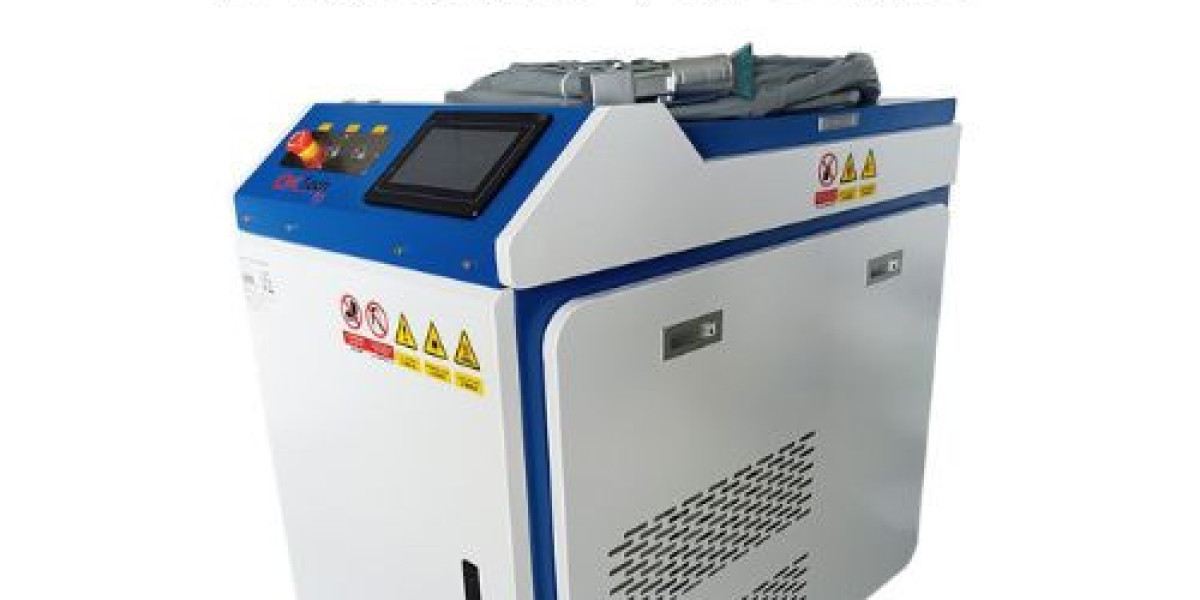This article provides a complete and detailed overview of what you should know before purchasing a laser cleaning machine for sale, including its working process, industrial applications, safety practices, maintenance insights, and essential buying considerations.
Understanding the Concept of Laser Cleaning Technology
Laser cleaning is a non-contact, dry, and precise method used for surface preparation and contamination removal. The system uses a focused laser beam to vaporize unwanted layers—such as rust, paint, or oxide—without the need for chemicals or abrasives.
The technology operates by adjusting laser parameters such as pulse energy, repetition rate, and scanning speed to match the cleaning task. The laser beam interacts with contaminants that have different absorption properties than the base material, ensuring selective removal. This makes the process clean, accurate, and safe for delicate surfaces.
When exploring a laser cleaning machine for sale, understanding this mechanism is essential. It helps determine which model aligns with your material type, cleaning depth, and production speed.
How a Laser Cleaning Machine Works
A typical laser cleaning system consists of a laser source, control unit, cooling system, and handheld or automated cleaning head. The process begins when the laser emits a beam that is directed onto the target surface. The contaminants absorb the energy, resulting in rapid heating, expansion, and evaporation.
There are two main cleaning modes:
Thermal Ablation – The contaminant layer absorbs the laser’s thermal energy, causing it to vaporize.
Photoablation – The laser energy breaks molecular bonds, directly removing the material without heat transfer.
The efficiency of the process depends on laser parameters like wavelength, pulse width, and power. High-powered systems are suited for industrial-scale operations, while lower-powered portable units are ideal for precision cleaning in maintenance or restoration work.
Common Industrial Uses of Laser Cleaning Machines
When considering a laser cleaning machine for sale, it’s important to match its capabilities with the specific industry applications. Laser cleaning technology has found use in a wide range of sectors:
Automotive Manufacturing: Used for removing paint, coatings, and oxides before welding or bonding components.
Aerospace Industry: Ideal for cleaning turbine blades, molds, and precision components without mechanical damage.
Metal Fabrication: Cleans welding seams, removes rust, and prepares surfaces for coating or galvanization.
Electronics: Removes micro-contaminants without affecting delicate circuits or solder joints.
Cultural Heritage Restoration: Restores historical artifacts and monuments by removing pollution and corrosion layers without harming the original material.
The versatility of this technology makes a laser cleaning machine for sale an investment that fits into both small workshops and large-scale production environments.
Types of Laser Cleaning Machines
There are several categories of laser cleaning machines, each designed to meet specific operational demands:
Handheld Laser Cleaning Machines – Lightweight and easy to maneuver for on-site cleaning or complex geometries.
Automated Laser Cleaning Systems – Integrated into production lines for high-speed, repetitive cleaning tasks.
Portable Laser Cleaning Units – Compact solutions for fieldwork, maintenance, and mobile services.
High-Power Industrial Systems – Built for heavy-duty rust or paint removal from large metal surfaces.
When exploring a laser cleaning machine for sale, understanding these categories ensures that you select the right system for your workflow and production needs.
Essential Factors to Consider Before Buying
Choosing a laser cleaning machine for sale requires careful evaluation of several technical and operational aspects. Some of the most important factors include:
Laser Power Output: Defines the machine’s cleaning speed and depth capability.
Wavelength and Pulse Duration: Affects material compatibility and cleaning precision.
Cooling System Type: Determines machine longevity and consistent performance.
Mobility and Ergonomics: Especially important for portable or handheld applications.
Control Interface: User-friendly operation and adjustment of cleaning parameters.
Safety Features: Includes laser shielding, interlocks, and proper ventilation systems.
Understanding these specifications helps you identify whether the machine suits your production environment, whether it’s a factory, workshop, or field operation.
Cost and Value Perspective
The price of a laser cleaning machine for sale can vary widely based on its power range, automation level, and brand reputation. Entry-level handheld models generally range from 100W to 500W and are suitable for maintenance and light industrial cleaning. High-performance systems, ranging from 1000W to 3000W, are designed for continuous heavy-duty use in manufacturing environments.
While the initial investment might seem high compared to traditional cleaning methods, the long-term savings in consumables, maintenance, and environmental compliance make it a cost-effective choice. The elimination of chemicals and reduced labor requirements further enhance the value proposition.
Maintenance Practices for Long-Term Reliability
Maintaining a laser cleaning machine is essential for achieving consistent results and extending its operational lifespan. Regular checks should include:
Cleaning optical lenses and ensuring proper beam alignment.
Monitoring cooling system performance to prevent overheating.
Inspecting the fiber connections and electrical components.
Updating control software for performance optimization.
Keeping the work environment dust-free to maintain optical clarity.
A well-maintained laser cleaning machine for sale not only delivers stable results but also prevents costly downtime in industrial operations.
Safety Protocols in Laser Cleaning Operations
Laser cleaning, though efficient, requires strict adherence to safety guidelines to protect operators and surrounding equipment. Every workspace should include laser safety glasses rated for the specific wavelength in use, enclosed work areas, and appropriate ventilation.
Additionally, operators must receive proper training in handling the laser cleaning head and understanding emergency shutdown procedures. Proper grounding and isolation of the laser source are also critical to avoid electrical risks.
Before purchasing a laser cleaning machine for sale, always confirm that the supplier provides training support and detailed safety documentation.
Why Laser Cleaning Is the Future of Surface Preparation
With global industries shifting toward sustainability and efficiency, laser cleaning stands out as a future-proof solution. It reduces waste, eliminates hazardous chemicals, and enables precise control over cleaning intensity. The non-contact nature of the process ensures the longevity of materials, which is crucial in sectors that demand surface integrity.
Investing in a laser cleaning machine for sale means aligning with a technology that supports eco-friendly manufacturing, minimizes human exposure to harmful substances, and delivers repeatable performance.
Final Thoughts
The demand for a laser cleaning machine for sale continues to grow as industries recognize its potential to replace outdated cleaning techniques. From restoring heritage sites to maintaining industrial components, the precision, speed, and sustainability of laser cleaning technology redefine what modern cleaning should look like.
Selecting the right machine involves understanding your application requirements, desired power output, and operational environment. By focusing on quality, support, and adaptability, businesses can achieve both productivity and environmental compliance.
















